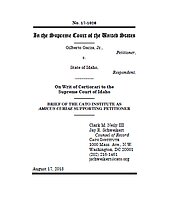Learn more about Cato’s Amicus Briefs Program.
The Supreme Court recently affirmed that the Sixth Amendment secures “a defendant’s … autonomy,” McCoy v. Louisiana, 138 S. Ct. 1500, 1511 (2018), and that violations of autonomy do not require a showing of prejudice. This principle of defendant autonomy has received the most attention in the context of trial rights, but it applies equally when a defendant decides whether to appeal his conviction—whether that conviction was obtained as the result of a trial or a guilty plea. The defendant, not his attorney, has the sole prerogative to decide whether to appeal a conviction, and his attorney must ultimately respect his wishes.
The question in this case is, essentially, whether the bedrock principle of defendant autonomy should be discarded when defendants waive certain appeal rights as part of a plea bargain. Gilberto Garza Jr. wished to challenge the legality of his conviction, and instructed his attorney to file an appeal. But his attorney refused this request, on the ground that Mr. Garza’s plea agreement included a limited waiver of his rights on appeal, and thus, any appeal would be futile. Eight federal circuit courts have addressed exactly this situation, and held that attorneys may never disregard a client’s express instructions to file a notice of appeal, no matter the content of their plea agreements. This rule is eminently sensible, because so-called “appeal waivers” can never actually waive all of a defendant’s appeal rights. At the very least, even defendants who sign even the broadest appeal waivers still retain the right to challenge the validity, scope, and enforceability of their plea agreement and waiver.
But the Idaho Supreme Court, joining two other federal circuits in the minority position, reached a different conclusion, and held that Mr. Garza’s attorney was permitted to ignore his client’s instruction. The court relied largely on the argument that if defendants file appeals notwithstanding waivers, that can sometimes constitute a breach of the plea agreement, and put the defendant at risk of losing the benefits of his plea. But, as Cato argues in its amicus brief in support of Mr. Garza, while that is an important practical consideration to discuss with the defendant, it is ultimately the defendant’s choice to decide how to weigh that risk against the possible benefit of an appeal. When it comes to those fundamental matters within the scope of a criminal defendant’s autonomy, this Court has repeatedly rejected similar paternalistic arguments for overriding a defendant’s informed, voluntary decision. There is no reason this case should be any different.
Finally, securing a defendant’s fundamental right to decide whether to appeal a conviction—even when obtained through a plea bargain with an appeal waiver—is especially important in light of the increasing prevalence of plea bargaining, rather than jury trials, as the default means of adjudicating criminal cases. In light of the concerning fact that plea bargains of dubious legal and moral legitimacy make up the overwhelming percentage of today’s criminal convictions, it is all the more important to ensure that defendants are guaranteed the right to decide whether and how to challenge the lawfulness of their pleas.


